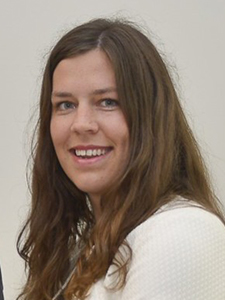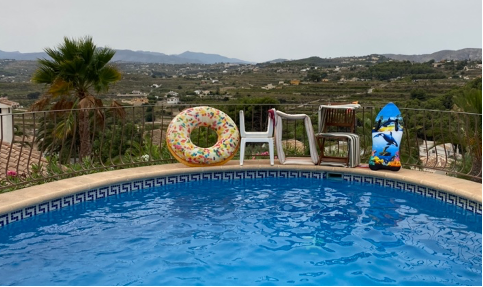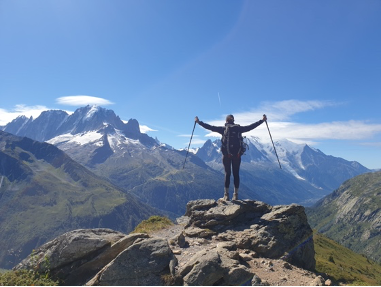- Who We Are
- Updates & News
- Standards
- Software Tools
- Network Studies
- Community Forums
- Education
- New To OHDSI?
- Community Calls
- Past Events
- Workgroups
- Tutorials
- 2025 ‘Our Journey’ Annual Report
- Current Events
- Support & Sponsorship
- 2025 Global Symposium
- 2025 APAC Symposium
- 2026 Global Symposium
- Github
- YouTube
- X/Twitter
- Newsletters
Collaborator Spotlight: Aniek Markus
Previous Collaborator Spotlights
Aniek Markus has a double bachelor’s degree in Econometrics/Economics and a master’s degree in Econometrics from Erasmus University Rotterdam.
During her studies, she worked as a research assistant at the Erasmus School of Health Policy and Management, where she investigated ethnic inequalities in deceased donor kidney allocation and the productivity of Dutch hospitals. She wrote her master’s thesis on the causal effects of binary, continuous and multivariate treatments using propensity score methods. Currently, she is pursuing a PhD at the department of Medical Informatics with a focus on explainable artificial intelligence.
Aniek has been an OHDSI collaborator throughout her PhD journey at Erasmus; her first talk focused on “Amongst Patients Hospitalized with Pneumonia, Who Are Most Likely To Require Intensive Services or Die?” during the COVID Study-A-Thon final call. In the latest OHDSI Collaborator

Spotlight, she discusses her journey to health data science, her focus on explainable AI, and how OMOP and OHDSI tools are assisting her research career.
Prior to beginning your PhD program in Health Data Science, you earned degrees in economics and business analytics areas. What motivated you to move into the healthcare field?
I like to be around people, work together with other people, and to work for the benefit of people. Hence, very early in my studies I knew a social domain would fit me better and I am sure everyone in the community must agree that contributing to improve health care for people is much more rewarding than, for example, working to increase profit margins.
I strongly believe my studies in Econometrics prepared my very well for the interdisciplinary field of medical informatics. The name of the study is misleading, because the fact that this discipline originated in economics is outdated now that big data is available everywhere in society. The ethical challenges and relative novelty of the use of big data make the healthcare domain a very interesting field for research. I tend to not take the set route, but I think we can still do a better job at recruiting in these areas of studies as the acquired toolkit is domain independent.
The pandemic began early in your PhD journey, and you took a leadership role in the COVID study-a-thon in March 2020. What was that experience like, and what were your first impressions of the OHDSI community?
Resilient, collaborative, and dedicated. I remember not sleeping a lot those four days and giving my first-ever presentation of my PhD online at 3AM local time. Working towards a common goal in a team with people from all over the world was very exciting and the enthusiasm was contagious. Looking back, I learned a lot about the community thanks to that experience and given the sudden nature of it, I did not have time to think whether I was ready for a leadership role. Hence, my advice to other early researchers would be to just go for it whenever there is an opportunity. The community is very supportive!

Aniek Markus and colleagues Cynthia Yang, Tom Seinen, and Daniel Jeannetot found a nice area to join the virtual 2021 OHDSI Global Symposium.
Your focus at Erasmus is “explainable artificial intelligence.” Can you discuss that specific focus and work you have done in the area?
Clinical prediction models have potential to improve patient care by personalizing treatments and can help address challenges in growing health expenditures, but implementation in clinical practice is still limited. Lack of transparency is – at least in the current state of AI maturity – still one of the main problems. Insight into how and why AI models produce predictions can be useful to assist implementation in practice by allowing for a human in the loop to detect and correct problems (e.g. existing biases). In my work, I investigate how different types of explanations (e.g. model-based, attribution-based and example-based) can help to overcome the transparency problem of AI in health care.
In recent work, I explore the trade-off between model performance and interpretability, which is often (incorrectly) assumed to exist. We show it is important that simple models are also considered when developing prediction models, as complex models might not always have better performance. In earlier work, we investigated the stability of prediction models and showed it is important to be careful when using LASSO regression to identify ‘risk factors’.
Erasmus was named the coordinating center for the DARWIN EU® initiative. What has it been like working in the department to help build this system from the ground up?
It is very motivating to see how years of hard work by many people in the community will soon enable the use of real-world evidence for regulatory decision-making. To do research in an environment where research efforts make impact is exciting!
You mentioned before how both OMOP and OHDSI tools are a dream for researchers. How much have the data, tools and processes impacted the start of your journey as a researcher?
I like to solve new challenges and can be quickly bored by routine tasks. All the useful open-source tools available within the OHDSI community allowed me to build further on existing work and solve new challenges right from the beginning. I generally prefer to spend my time thinking of a smart way to develop something sustainable. Hence, I very much share the OHDSI mindset. I am not sure if I fully valued the worth of starting research in an environment with so much data during the beginning of my PhD. But it has certainly provided me with very valuable insights in real-world data collection processes that are very helpful to also understand limitations in existing modelling methods.
What are some of your hobbies, and what is one interesting thing that most community members might not know about you?
I love to do all kinds of sports! Last year, I participated in the ¼ triathlon and you can usually find me cycling in the weekends. When I have a bit more time (aka holiday) I like to go on outdoor adventures; canoeing in Sweden, hiking the Tour du Mont Blanc or road tripping in New Zealand. Always open for community input on next adventures!
One interesting thing: when I’m stuck doing research, I like to bake a cake or cook a nice meal to clear my mind.

